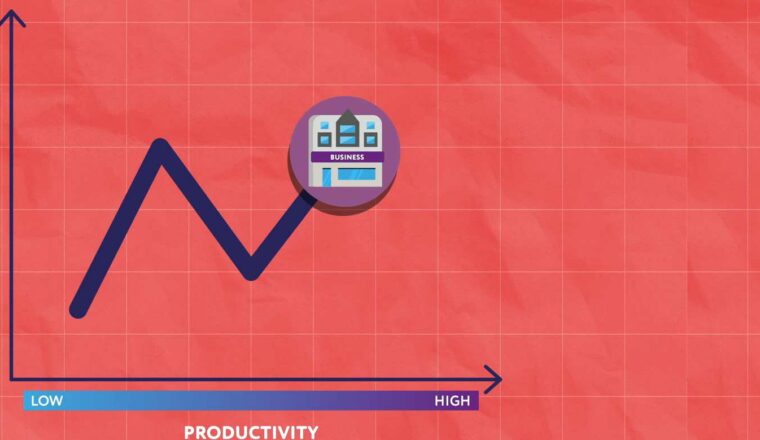How we should invest in productivity
Dr Paul Fisher is Honorary Professor at Warwick Business School and a Fellow at the Cambridge Institute for Sustainability Leadership’ as well as a Visiting Professor at the London Institute of Banking and Finance (LIBF) and at University of Richmond, London, and a Senior Research Fellow at the King’s College Business School. He is also a NIESR Governor. This blog was first published by NIESR, as part of its work leading the UK Productivity Commission.
Output growth has been slowing in the developed world for at least twenty years, characterised by an underlying slowdown in measured productivity. The UK economy appears to have under-performed its peers. Despite many years of academic research, there is no consensus on why, nor what to do about it. We do not even agree on when it started. My upcoming UK Productivity Commission paper contends that the UK productivity slowdown has been much longer in the making than usually assumed.
The simplest explanation is often the most useful. Economic growth at an exponential rate was never going to be sustained forever. Even if a country grows at the disappointing rate of say 2% per annum it will double in size every 36 years, and then double again in the next 36.
Such rates of growth are unsustainable as the Earth’s resources would simply be exhausted, especially in relation to manufactured goods or construction. Rather, as industrialised economies mature, they move increasingly into services and then into digital services. Manufacturing is now less than 10% of UK output, and its employment and investment are even lower shares.
Services have much slower measured productivity growth than manufacturing. The very concepts of productivity in services are not always clear. It is the quality and nature of the service that changes over time not always the ’efficiency’ in terms of time taken to make a unit of production. And even in manufacturing, productivity slows as the potential for further gain diminishes. Agriculture was once the dominant sector but became increasingly mechanised, and now it is less than 1% of UK output. The slowing in measured productivity is nevertheless remarkable given the fantastic improvements in mobile computing which have revolutionised the way we all live over the past quarter century.
Slowing growth tends to be perceived as a terrible thing: it dampens the growth of real private incomes and undermines the fiscal position as tax receipts cannot meet the simultaneous and siren demands for higher expenditure, lower tax and reduced national debt. Even looking through the effects of the pandemic, there has been a squeeze on public services and little prospect of improvement in government debt to GDP. And the UK now has its highest tax burden for 70 years. These trends may be exacerbating inequality and other social ills.
What to do?
Policy will not succeed by looking backwards – the UK is not going to recreate past manufacturing glories, nor will it resume historic growth rates. But this is not a counsel of despair. Policy can and should still aim to support and maximise the sustainable rate of growth; although more time needs to be spent on working out what that is now and in the future. And government should still aim to rectify some of the under-performance of the UK that has become apparent since the global financial crisis (but may have started much earlier).
The UK was the first country to have an industrial revolution. De-industrialisation started decades ago, but we still lament that change rather than embrace it. Constructively, where should our focus be? Policy should be based on where the economy is today and its direction of travel.
The objective should not be solely seen in terms of GDP. As there are increasing network benefits from digitalisation which are not monetised, GDP is an increasingly poor proxy for welfare and happiness. Policy should focus on promoting the public good in a broader sense. In particular, it needs to reflect both positive and negative externalities arising from private markets to make sure that the ‘invisible hand’ is not left to wander on its own. Even pro-market policies need to be active, not passive.
Growth of any description requires investment. But tax breaks for investment in IT, plant machinery are not going to be transformative for most service-sector businesses. We need much wider concepts of the investment needed. That might be in intangibles or simply in education and training.
People’s revealed preference as they get better off is for spending more of their income on health and education. That seems to be true of all societies as they develop, and it is a key underpinning of productivity growth. But it can be expanded well or badly: one of the reasons for the UK under-performing is likely to be the poor health of some potential workers, and poor educational outcomes for others.
This is not meant as a party-political point: alternative policies to promote health and education could be public sector-led, or could be to encourage greater private sector provision. At the moment, the UK is doing neither. Just squeezing the public sector is not an adequate response.
People are not all the same and not all regions are equally prosperous. Many of the required investments can and should be targeted where they are most needed.
Another area ripe for policy focus is the digital networks that we increasingly rely on. These are not just for entertainment. Investment in digital provision could be one way to make both health and education more effective as well as more efficient. But that means doing things differently not just trying to replicate the physical experience online, which is always disappointing.
Working from home does not have to be less productive if properly supported. And it could help to take the pressure off our over-loaded transport network, and help to reduce the pollution associated with business-related travel.
Spending more time working from home and less time travelling to the office seems to be a real benefit to some. We should not neglect or seek to reverse what is seen as one of the biggest-ever improvements in working life for many people. Government and employers need to embrace the change and look at how working from home can be made more productive, for example by investing in digital networks and systems.
Then there is climate change. We can all see it happening around us and the statistics on the pace of global warming and sea-level rise are scary. If the world does not decarbonise, it risks a complete economic meltdown at some point in the future. The negative impacts from climate change will get worse – sometimes in unforeseen ways – and governments and people are likely to panic, leading to mass migrations and violent conflict. The UK has a historic and moral obligation to move first and fastest.
Investment in new green technologies could galvanise the UK economy and improve living standards. Cheap, plentiful renewable energy is no longer just a fancy. On the day I write, over half of the UK’s national grid is being powered by renewables. The UK needs to invest more in renewables, but more importantly in energy storage systems to provide stability of supply. Why did any country ever think that relying on foreign, undemocratic countries to supply them with oil and gas was going to provide secure energy supplies?
In a nutshell, we need active policies to support economic welfare, not just GDP. But above all, we need to look forwards not backwards. Our economy needs to fully embrace structural change and the digital age. We should aim for continual improvement in health and education provision, and invest in a smooth transition to net zero as soon as possible.
For more resources from the Productivity Commission, read:



